|
by Steve Aquino from MotherJones Website
Should President Obama have the power to shut down domestic Internet traffic
during a state of emergency?
On Wednesday they introduced a bill to establish the Office of the National Cybersecurity Advisor
- an arm of the executive branch that would have vast
power to monitor and control Internet traffic to protect against threats to
critical cyber infrastructure. That broad power is rattling some civil
libertarians.
The bill does not define a critical information network or a cybersecurity emergency. That definition would be left to the president. The bill does not only add to the power of the president.
It also grants the Secretary of Commerce,
This means he or she can monitor or access any data on private or public networks without regard to privacy laws. Rockefeller made cybersecurity one of his key issues as a member of the Senate intelligence committee, which he chaired until last year.
He now heads the Committee on Commerce, Science and Transportation, which will take up this bill.
Snowe echoed her colleague, saying,
But the wide powers outlined in the Rockefeller-Snowe legislation has at least one Internet advocacy group worried.
The bill could undermine the Electronic Communications Privacy Act (ECPA), says CDT senior counsel Greg Nojeim.
That law, enacted in the mid '80s, requires law enforcement seek a warrant before tapping in to data transmissions between computers.
Jennifer Granick, civil liberties director at the Electronic Frontier Foundation (EFF), says that granting such power to the Commerce secretary could actually cause networks to be less safe.
When one person can access all information on a network,
The bill's scope, she says, is "contrary to what the Constitution promises us."
That's because of the impact it could have on Internet users' privacy rights:
And this might violate the Constitutional protection against searches without cause.
Nojeim, though, thinks it's possible the bill's powers could be trimmed as it moves through Congress.
|

